|
|
|
Sort Order |
|
|
|
Items / Page
|
|
|
|
|
|
|
| Srl | Item |
| 1 |
ID:
165238


|
|
|
|
|
| Summary/Abstract |
Through bringing history into conversation with ethnography, this paper re-examines scholarly understandings of Hindu nationalism and the practice of seva (service). Whereas much scholarship addresses Hindu nationalist service through a secular-liberal register, this paper considers what this language excludes. Giving critical attention to elite activists within the Hindu nationalist-led Vanavasi Kalyan Kendra (Tribal Welfare Centre), in Jharkhand, India, my research demonstrates how elite activists translate service into a religious language of somatic representation. This constructs marginal agents as passive subjects of a heavily moralistic ethical-self making project. This critical analysis opens up for study the differing ritual-politics of caste and gender which underlie the participation of marginal actors, practices which are not reducible to a discourse of religion or a universal category of acts. In order to grasp these more complex models, this paper gives importance to the ways in which its ethical discourses are inhabited in manifold ways. This tells a story of how Western models of religion are parochialized, and challenges the relationship between authority and agency which permeate our imagination of non-liberal discourses like those invoked by Hindu nationalist service projects.
|
|
|
|
|
|
|
|
|
|
|
|
|
|
|
|
| 2 |
ID:
165236
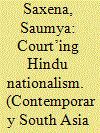

|
|
|
|
|
| Summary/Abstract |
This paper demonstrates the role of the Courts in lending currency to the politics of Hindutva in the 1990s. It focuses on some of the significant and connected cases of the Ayodhya dispute and the infamous Hindutva judgments to illustrate how the court legitimised, perhaps inadvertently, a jingoistic and intolerant ideology as an acceptable political strategy. The rise and electoral successes of the Bharatiya Janata Party (BJP) post-emergency accompanied the party's reliance on the judicial instruments to make its Hindu nationalist ideology palatable to a larger audience and the ‘secular’ citizen. Contrary to the stance of Hindu nationalist organisations against codification of Hindu law and any state interference in matters of religion at the time of independence, in the 1990s the movement relied significantly on judicial instruments for its own legitimacy and for expanding the domain of religion by seeking the patronage of ‘law’. The Court, in what came to be known as the Hindutva judgments, attempted to separate ‘Hindutva’ from ‘Hinduism’, thereby aiding the launch of a new dawn of Hindutva which could then become synonymous with democracy and development. Most significantly, it also opened the doors for electoral promises to be routed through the courts.
|
|
|
|
|
|
|
|
|
|
|
|
|
|
|
|
| 3 |
ID:
165240
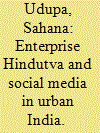

|
|
|
|
|
| Summary/Abstract |
This paper delineates ‘enterprise Hindutva’ as a mediatized form of Hindu nationalism shaped largely by the affordances of social media and the cultural practices surrounding them in urban India. Enterprise Hindutva is argumentative, experientially voluntary and capable of working with contradictions. It inhabits the ideological project envisioned as a range rather than a point of convergence. Enterprise Hindutva suggests that it is through the very bickering on social media and repetition of simplified summaries of key ideological principles that Hindutva finds its latest mediatic conditions for renewal.
|
|
|
|
|
|
|
|
|
|
|
|
|
|
|
|
| 4 |
ID:
165241
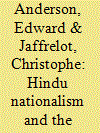

|
|
|
|
|
| Summary/Abstract |
This in-depth interview with Professor Christophe Jaffrelot – one of the world’s most distinguished, prolific, and versatile scholars of contemporary South Asia – focuses on his first area of expertise: Hindutva and the Hindu nationalist movement. In conversation with Dr Edward Anderson, Jaffrelot considers the development of Hindutva in India up to the present day, in particular scrutinising ways in which it has evolved over the past three decades. The discussion explores the diversity of Hindu nationalism and how the movement and ideology have spread beyond the purview of the RSS into various new spaces and normalised, vernacular expressions of ‘neo-Hindutva’. The interview also reflects on recent tensions involving vigilantism and the banalisation of Islamophobia and anti-Dalit violence, and considers what Hindutva’s current proliferation will mean for the future of Indian democracy.
|
|
|
|
|
|
|
|
|
|
|
|
|
|
|
|
| 5 |
ID:
165237


|
|
|
|
|
| Summary/Abstract |
This article is a preliminary attempt to understand the dynamics of how Patanjali and Baba Ramdev represent ‘Hindu nationalism’, or Hindutva (Hinduness) in Nagaland, India. One can read Baba Ramdev's foray into the region through the promotion of yoga, Ayurveda, and national health, as a form of ‘neo-Hindutva’ that is increasingly diffuse and moves away from a more militant pathway of established Hindutva designs. If one considers the work of Patanjali in Nagaland as an attempt to homogenise and unify a set of practices surrounding food and health practices, then, one can read this as an attempt to assert a singular somatic imagination, increasingly influenced by Hindutva ideas about the body, ‘the health of the nation’, and the promotion of swadeshi (indigenous goods) as patriotic duty. This article highlights the way Ramdev and Patanjali's business empire is trying to move beyond the ‘cow belt’ of north India, comprising mainly of ‘Hindu-Hindi’ into regions that are more diverse linguistically and historically, and culturally viewed as ‘un-Indian’.
|
|
|
|
|
|
|
|
|
|
|
|
|
|
|
|
| 6 |
ID:
165235
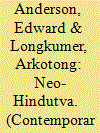

|
|
|
|
|
| Summary/Abstract |
The start of this century has seen Hindu nationalism emerge as a more dominant force than ever before. Hindutva is also evolving and shifting in new, surprising, and significant ways, requiring us to reassess and reframe prevailing understandings. This special issue seeks to identify and understand the ways in which Hindu nationalism increasingly permeates into new spaces: organisational, territorial, conceptual, rhetorical. It develops and expands on the idea of ‘neo-Hindutva’: ‘idiosyncratic expressions of Hindu nationalism which operate outside [or on the peripheries] of the institutional and ideological framework of the Sangh Parivar’ [Anderson, Edward. 2015. “‘Neo-Hindutva’: The Asia House M.F. Husain Campaign and the Mainstreaming of Hindu Nationalist Rhetoric in Britain.” Contemporary South Asia 23 (1): 45–66]. The scope of the articles in the special issue reflects the diversity of contemporary Hindutva, which appears simultaneously brazen but concealed, nebulous and mainstreamed, militant yet normalised. They cover a wide range of topics and places in which we can locate new forms of Hindu nationalism: courts of law, the Northeast, the diaspora, Adivasi communities, and the internet. The special issue also includes an in-depth interview with Christophe Jaffrelot and a postscript by Deepa Reddy. These interventions, we hope, go some way to helping us make sense of contemporary Hindutva.
|
|
|
|
|
|
|
|
|
|
|
|
|
|
|
|
| 7 |
ID:
165239
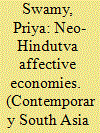

|
|
|
|
|
| Summary/Abstract |
This article contests the role that India as a ‘motherland’ plays in the circulation of neo-Hindutva sentiments by exploring the relationship between reterritorialisation, affect and citizenship identities among Surinamese Hindus in the Netherlands. Following Jones (2016, 2014), this article posits that Surinamese Hindu citizens are ‘conditional’, which causes some community actors to strategically reterritorialise Hindu practices and identity as part of the Dutch landscape. Other groups protest their place as conditional citizens as they see their religious practices under threat by cultural and neo-colonial appropriations. In this way, what it means to be Hindu is circulated through a neo-Hindutva affective economy (Ahmed 2004). By presenting ethnographic data that explores the importance of pride and offense as ways to ‘be Hindu’ at an HSS shakha summer camp in 2016 and during a Hindu protest campaign in 2015, this article aims to make sense of the ways in which neo-Hindutva sentiments associated with reterritorialisation strategies respond to citizenship regimes that exist in the Netherlands today.
|
|
|
|
|
|
|
|
|
|
|
|
|
|
|
|
|
|
|
|
|